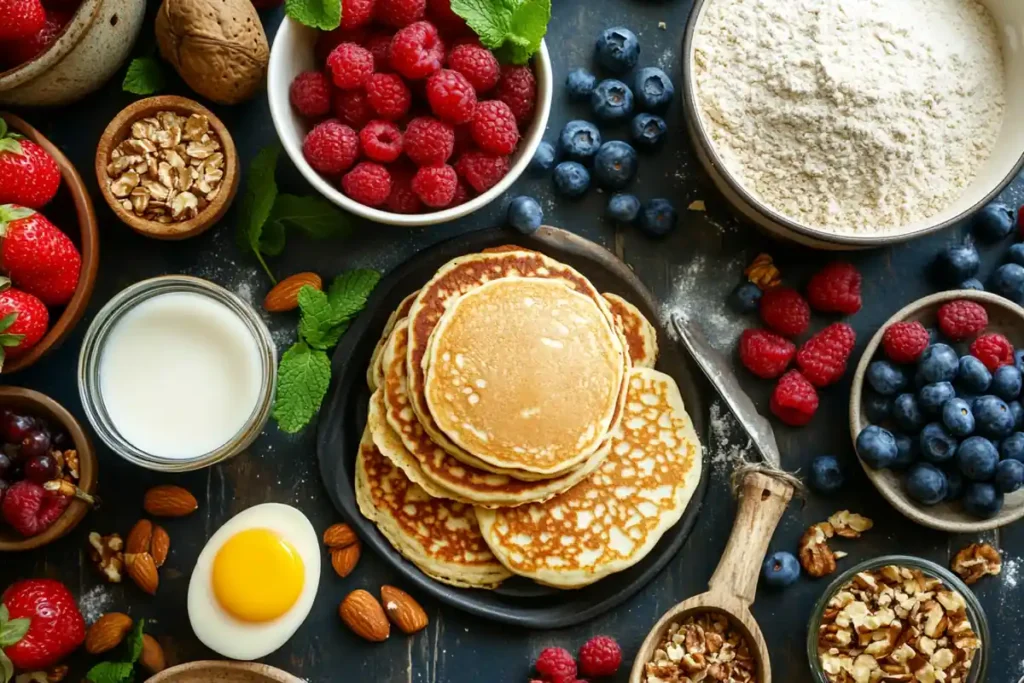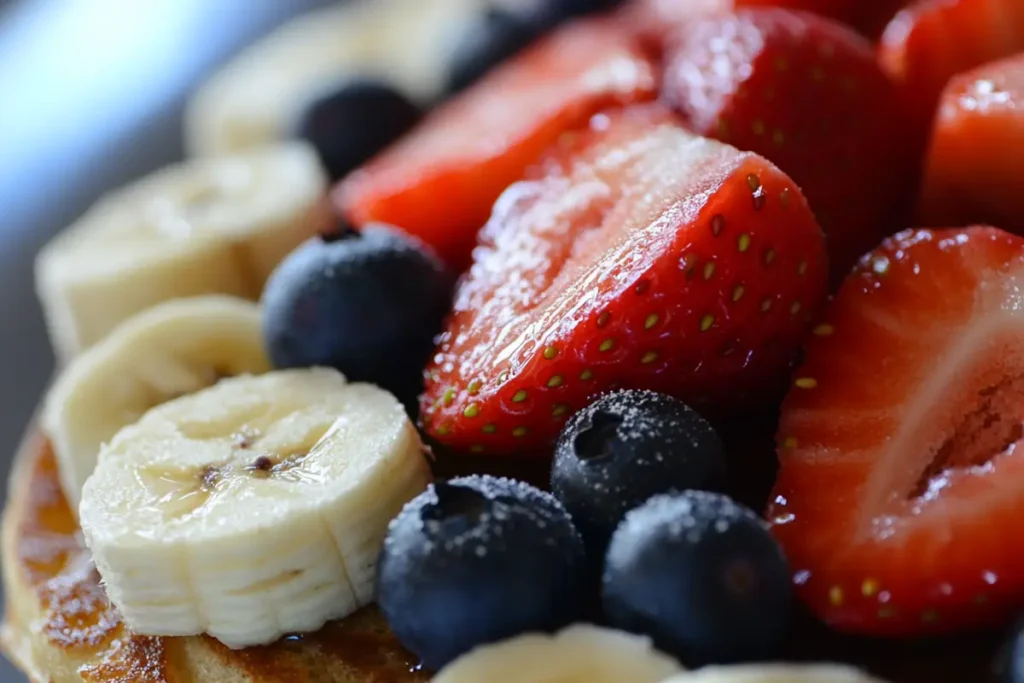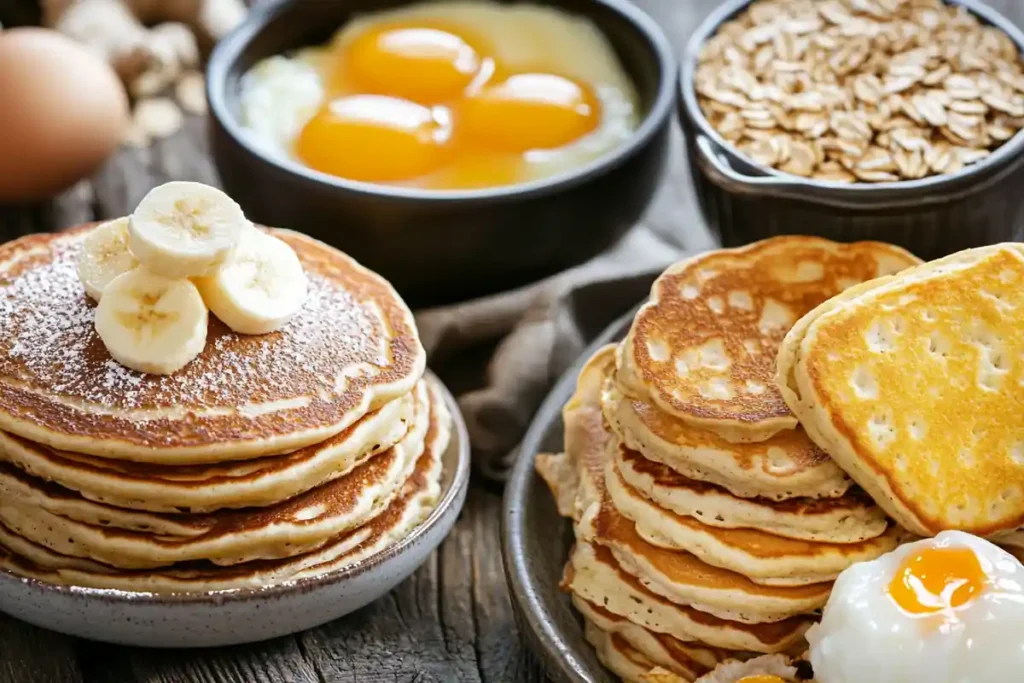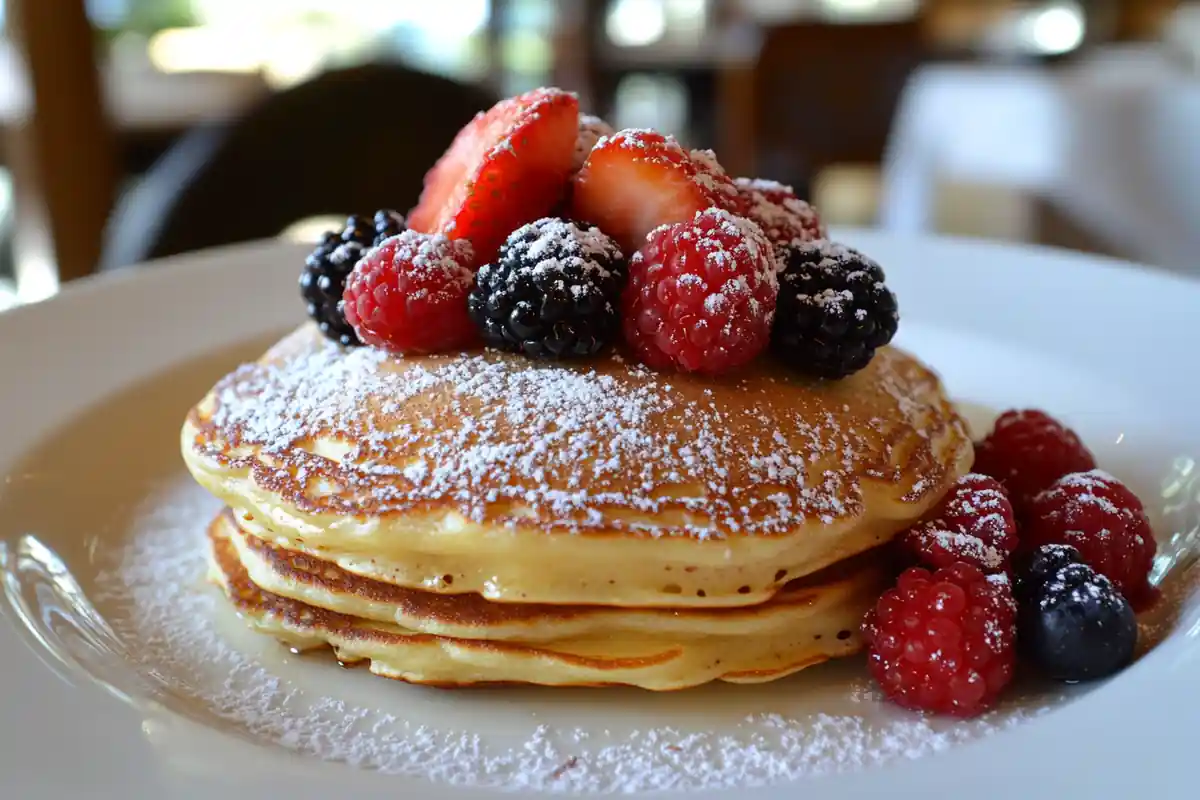Is it okay to have pancakes for breakfast? This article explores the nutritional aspects, considers dietary impacts, and answers whether pancakes can fit into a healthy morning routine. We will discuss various considerations to help you make an informed choice about enjoying this classic breakfast dish.
Understanding Pancakes for Breakfast: A Look at the Basics of this Meal
Many people love starting their day with pancakes. However, it’s important to look at what they offer nutritionally. For example, what are the usual ingredients in pancakes? Typically, they include flour, milk, eggs, and sugar. Therefore, understanding these basic components helps us evaluate their nutritional impact.
The Basic Pancake Ingredients and Their Impact on Your Diet
The main components of pancakes are often refined flour, sugar, and dairy. These ingredients can provide a quick energy source. However, pancakes made with these traditional ingredients might not be the most nutritious choice. Consequently, we should explore healthier options for enjoying pancakes for breakfast.
Nutritional Aspects of Pancakes: What Are You Really Consuming When Eating Pancakes?
Pancakes made with refined flour are mainly carbohydrates, with little fiber. Additionally, they often have added sugar, which could lead to rapid blood sugar spikes. Therefore, it is important to be mindful of these effects. However, the nutritional profile of pancakes changes with the ingredients used.
Health Considerations When Eating Pancakes for Breakfast: Is This a Healthy Choice?
When considering pancakes for breakfast, it’s crucial to assess their health implications. Therefore, we should consider the balance of nutrients, their impact on weight, and other health factors. Ultimately, pancakes, like any food, should be part of a well-rounded eating plan.
Are Pancakes Good for Weight Management? Considering Pancakes and Weight
Because pancakes are often high in carbohydrates and sugar, eating them regularly might affect weight management. Furthermore, they lack fiber, which can make you feel hungry sooner after eating. However, it’s possible to modify pancake recipes to be more weight-friendly. For instance, you can include whole grains or protein-rich additions.
The Impact of Sugar in Pancakes: Understanding the Sweetness Factor
The sugar content of pancakes is a key concern. Excess sugar leads to weight gain and other health issues. Therefore, choosing pancake recipes with less added sugar is beneficial. Also, consider using natural sweeteners in smaller amounts.
Pancakes and Blood Sugar Levels: Understanding the Effect of Pancakes
Due to their high carbohydrate content, especially if made with refined flour, pancakes can cause a rapid rise in blood sugar levels. Consequently, those with diabetes should be especially careful. However, switching to whole grain flours and adding protein can help stabilize blood sugar.
Making Pancakes a Healthier Choice: Smart Swaps and Additions for a Better Meal

You can enjoy pancakes for breakfast in a healthier way. Therefore, consider making some easy changes to the recipe and your approach. These simple modifications can significantly improve the nutritional value of your pancakes.
Using Whole Grain Flours in Pancakes: Boosting Breakfast Fiber
Whole grain flours, such as whole wheat or oat flour, are richer in fiber than refined flour. Fiber helps with digestion and makes you feel fuller for longer. Therefore, substituting whole grain flours in pancakes is a great way to make them more nutritious.
Adding Protein to Your Pancake Recipe: Enhancing Breakfast with Protein
Protein is essential for feeling full and keeping your energy up. Adding protein to pancakes can help balance the carbohydrate content. For example, try adding protein powder, eggs, or Greek yogurt to the batter.
Controlling the Amount of Sugar: Reducing Added Sweeteners for Pancakes
Reducing added sugar is crucial for making pancakes healthier. Try to use natural sweeteners, such as mashed bananas or a touch of honey, in moderation. This way, you can still enjoy the sweet taste without the health downside.
Healthy Pancake Toppings: Smart Choices for a Nutritious Breakfast
The toppings you choose can greatly affect how healthy your pancakes are. Instead of syrup and whipped cream, consider fresh fruit, a sprinkle of nuts, or a spoonful of plain Greek yogurt. These options are more nutritious and lower in added sugar.
When to Eat Pancakes: Timing Your Pancake Enjoyment for Best Results

The timing of when you eat pancakes also matters. For many people, pancakes are a special weekend treat. However, how do they fit into your regular eating routine? Therefore, understanding when to enjoy them can help manage their impact.
Pancakes for Breakfast Timing: When Is It Best to Indulge in Pancakes?
Enjoying pancakes at the start of the day may work well for some. After all, this can help get you going in the morning. However, consider the carbohydrate load and what your day will involve. Moreover, be mindful of your overall daily eating habits.
Pancakes as an Occasional Treat: Balancing Enjoyment and Health When Eating Pancakes
Sometimes, it is okay to have pancakes. Instead of making them a daily part of your diet, think of them as an occasional treat. This way, you can still indulge without compromising your overall health goals. Therefore, moderation is key.
Adjusting Your Pancake Habits: Making Sustainable Choices with Pancakes
If you regularly enjoy pancakes for breakfast, consider making some adjustments. Try to modify your pancake recipe. Also, pair your pancakes with other healthy foods to balance out the meal. Therefore, creating a balanced breakfast is important.
Pancakes and Different Diets: Pancakes for Everyone, Regardless of Diet?
When it comes to diets, you must consider if pancakes can fit. Furthermore, consider the various eating styles and preferences. For example, can those who follow low carb, or gluten-free approaches enjoy pancakes? Therefore, let’s explore the possibilities.
Pancakes on a Low Carb Diet: Adapting Pancakes for Reduced Carbohydrates
Traditional pancakes are often high in carbohydrates. Therefore, they are usually not recommended on a low carb diet. However, you can adapt the recipe by using low carb flours like almond or coconut flour. This makes it easier to enjoy pancakes while limiting carbohydrates.
Gluten-Free Pancake Options: Delicious Alternatives for Those Avoiding Gluten
People following a gluten-free diet cannot use traditional flour. Therefore, they need alternative options. Luckily, you can make excellent gluten-free pancakes with rice flour, almond flour, or a blend of gluten-free flours. Gluten-free pancakes can be just as tasty and satisfying as their regular counterparts.
Pancakes for Vegetarians and Vegans: Easy Adaptations for Pancakes, Regardless of Diet
Vegetarians and vegans can easily enjoy pancakes. Vegetarians can use eggs in the recipe while vegans can use flax or chia seeds as an egg substitute. In addition, vegan milks and butter alternatives are readily available. Therefore, pancakes can be enjoyed by almost everyone.
Potential Downsides of Pancakes: Understanding the Risks of Eating Pancakes
While pancakes can be a pleasant treat, they have potential downsides. For instance, some people may have digestive issues. Furthermore, the high carbohydrate and sugar content can cause problems. Therefore, understanding these factors will help you make informed decisions.
Pancakes and Digestion: Potential for Bloating and Discomfort After Eating Pancakes
For some, pancakes can cause bloating or other digestive issues. These problems may be due to the ingredients, especially the refined flour and dairy. Therefore, paying attention to how your body reacts to pancakes is important.
The Downside of Added Sugar: The Negative Impacts of Excessive Sweeteners on Your Health
As discussed before, too much added sugar in pancakes is not good. High sugar intake leads to weight gain and other health issues. Therefore, it is essential to moderate the sugar in your pancakes.
Pancakes and Artificial Additives: Understanding Preservatives and Flavors in Pre-Made Pancakes
Some pancake mixes contain artificial flavors or preservatives. Therefore, these additives can be harmful to your health. For this reason, consider making pancakes from scratch with fresh, whole ingredients. This way, you can have greater control over what you’re eating.
Pancake Recipe Variations and Ideas: Getting Creative with Your Breakfast Pancakes

Exploring different pancake recipes can keep your breakfast exciting. Therefore, you can try various flavorings, ingredients, and enhancements. Accordingly, these variations can help you enjoy pancakes in a new way.
Savory Pancake Options: Moving Beyond the Traditional Sweet Pancakes
While pancakes are typically sweet, savory pancakes can be delicious. For example, try adding herbs, cheese, or cooked vegetables to the batter. Consequently, these savory pancakes can be a flavorful and different breakfast option.
Pancakes with Fruits and Nuts: Adding Flavor and Texture to Your Breakfast
Incorporating fruits and nuts into your pancake batter or as a topping is a good idea. They provide additional nutrients and flavor. Therefore, blueberries, bananas, or chopped walnuts are excellent additions. Another great option is sprinkling some chia seeds or sunflower seeds on top.
Pancake Stack Ideas and Presentation: Making Pancakes Visually Appealing for a Better Breakfast
The way you present your pancakes can make them even more appealing. Try layering your pancakes with different toppings or cutting them into fun shapes. Specifically, this is a good idea when you are making pancakes for kids. Undoubtedly, a visually appealing plate will enhance the experience.
Pancake Batter Enhancements: Elevating Your Pancake Recipe for More Flavor
Small enhancements to your pancake batter can greatly affect the final result. For example, a splash of vanilla extract or some lemon zest can add a depth of flavor. Additionally, consider using a bit of cinnamon or nutmeg for a warm, comforting taste.
Comparing Pancakes to Other Breakfast Options: Making Informed Choices for Your Meal

When considering pancakes for breakfast, it is good to compare them with other common breakfast choices. Therefore, evaluating their nutrients and benefits helps you make the best choice. Likewise, understanding these differences will help you decide what to eat.
Pancakes vs. Oatmeal: Fiber and Carbohydrate Comparison of These Breakfasts
Oatmeal is a good breakfast option because of its fiber content and ability to lower cholesterol. Comparatively, pancakes can be higher in carbohydrates and sugar. Therefore, if you’re looking for a fiber-rich choice, oatmeal might be better.
Pancakes vs. Eggs: Protein and Nutrient Comparison When Choosing Your Breakfast
Eggs are a protein-packed breakfast option, especially when paired with vegetables. Whereas, pancakes, especially with refined flour, are mostly carbohydrates. Thus, if you are seeking protein for sustained energy, eggs would be a better fit.
Pancakes vs. Toast: Evaluating Carbohydrate Sources for Your Breakfast
Whole grain toast can offer fiber, especially if paired with avocado or eggs. However, pancakes can be higher in added sugars and fats, depending on the recipe. Consequently, the choice depends on your nutritional goals. Basically, both have pros and cons.
Pancakes and a Balanced Breakfast: Ensuring a Mix of Macronutrients for Your First Meal
To make any breakfast complete, including pancakes, think about combining macronutrients. For example, combining pancakes with protein and fresh fruit will help you feel more satisfied. Accordingly, having a harmonious mix will help support sustained energy levels.
Pancakes and Conscious Eating: Mindful Pancake Enjoyment for a Healthier Approach
Practicing conscious eating habits is essential, especially when enjoying foods like pancakes. Indeed, being aware of your food choices and how they make you feel can help you have a healthier relationship with food. Furthermore, this also enhances your eating experience.
The Importance of Portion Control: Managing Your Pancake Intake to Avoid Overeating
Portion control is important with any food, including pancakes. Be mindful of how many you are eating. Therefore, using smaller plates can help with portion management. Moreover, it will help you feel less inclined to overeat.
Listening to Your Body’s Signals: Responding to Hunger and Fullness Cues While Eating Pancakes
Pay attention to your body’s hunger cues while eating pancakes. Eat slowly and stop when you feel full. In addition, this will improve your digestion and prevent bloating. Unquestionably, mindful eating is beneficial.
Savoring Each Bite: Appreciating the Flavor and Texture of Your Pancakes
Take the time to appreciate the taste and texture of your pancakes. Finally, conscious eating isn’t just about making healthy choices; it’s about making the most of every eating occasion. Altogether, this creates a more satisfying experience.
Making Pancakes a Part of a Balanced Lifestyle: Enjoying Pancakes Responsibly Within a Healthy Diet
Finally, it is important to understand if you can include pancakes as part of a balanced lifestyle. Consequently, the key is moderation and understanding what nutrients your body needs. Therefore, making smart choices about your pancakes can help you eat well and feel great.
Pancakes in Moderation: Balancing Indulgence and Health When Eating Breakfast Pancakes
Enjoying pancakes for breakfast is fine when done in moderation. Also, be mindful of your overall diet and lifestyle. Consequently, if you eat well overall, an occasional pancake breakfast is unlikely to cause any harm.
Balancing Pancakes with Other Foods: Creating a Well-Rounded Meal With Your Pancakes
Pancakes should not be your only breakfast. Pair them with protein-rich food like eggs or yogurt, and add some fruit. This way, you are getting a balanced mix of nutrients.
Being Mindful of Your Choices: Making Smart Decisions About Eating Pancakes
Ultimately, it is about making conscious choices. Choose healthier ingredients when you make your pancakes. Also, watch your portions. This way, you can enjoy pancakes without feeling guilty. Moreover, you will ensure it is a satisfying experience.
Frequently Asked Questions (FAQs)
Are pancakes for breakfast healthy?
Pancakes can be part of a healthy diet, but it depends on the ingredients and how often you eat them. Use whole grain flours, limit added sugar, and pair them with protein and fruit to make them more nutritious.
Is it okay to eat pancakes on a diet?
Yes, you can enjoy pancakes while on a diet. However, be mindful of your portion sizes and the ingredients used. Choose whole grains, add protein, and reduce added sugar to keep them within your dietary guidelines.
What is the best time to eat pancakes?
The best time to eat pancakes depends on your individual needs and routines. For example, pancakes for breakfast can be okay if you are active, but for others an occasional treat at weekends might be better. Consider also your overall daily eating habits.
Are pancakes good or bad carbs?
Traditional pancakes, made with refined flour are often considered “bad” carbs because they lack fiber and can cause blood sugar spikes. However, using whole grain flours instead can make them a source of healthier carbohydrates.
Conclusion
In conclusion, it is okay to have pancakes for breakfast. However, it’s essential to be mindful of how they fit into a healthy lifestyle. By making smart choices about ingredients, toppings, and portion sizes, you can enjoy pancakes as part of a balanced eating plan. Therefore, remember that moderation and mindful eating are key to enjoying all kinds of foods.

